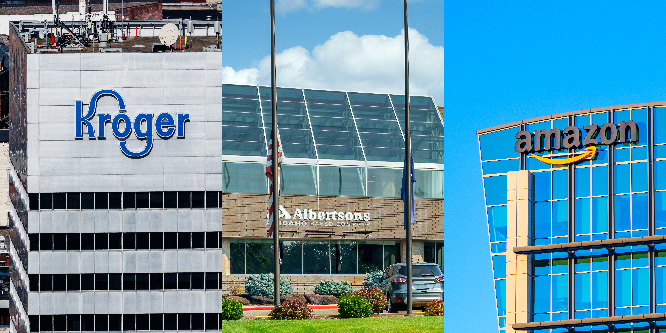
Photo: iStock | jetcityimage / knowlesgallery / Michael Vi
Kroger and Albertsons plan to sell between 250 and 300 stores to get approval from the Federal Trade Commission on the proposed merger between the two supermarket giants. Who will buy them if it goes that far?
Business Insider earlier this week reported on a note published by analysts at Bernstein that envisions a scenario where Amazon.com could purchase many, if not all, of the stores that Kroger and Albertsons are looking to offload. The two companies have stores overlapping in several large markets including Chicago, the Pacific Northwest, Phoenix and Southern California.
The article points to comments made by Amazon CEO Andy Jassy about the vital role that grocery plays in his company’s future growth plans.
Stores, he said in February on the company’s fourth-quarter 2022 earnings call, will be a critical part of the plan because physical locations are required to succeed in perishable categories.
Mr. Jassy told analysts that Amazon’s online grocery business is strong.
“If you think about the aisles in a grocery store, from packaged food to paper products to canned goods to pet supplies to health and personal care items to consumables, we have a very large business there that continues to grow at a rapid clip and that we think will continue to grow,” he said.
Mr. Jassy also said that Whole Foods, with nearly 500 stores, has made significant strides in growing its profitability.
It’s Amazon Fresh, Amazon’s mass-market grocery concept, where Mr. Jassy sees the greatest upside potential even as his company has temporarily hit pause on opening new locations.
Amazon is tweaking the Fresh concept, Mr. Jassy said, “to find a format that we think resonates with customers [and] it’s differentiated in some meaningful fashion and where we like the economics.”
He later added, “When we do find that equation, we will expand it more expansively.”
Amazon’s big plans for grocery, matched with Kroger and Albertsons’ desire to sell, have led to “a very rare opportunity in U.S. retail,” according to Bernstein.
“In theory, Amazon could plug acquired stores into its network, which would (potentially at least) prove less painful and costly than building a distribution and logistics network from scratch,” the analysts wrote.
Amazon may not pursue a deal over concerns it could lead to more regulatory scrutiny of its operations.


Leave a Reply
You must be logged in to post a comment.